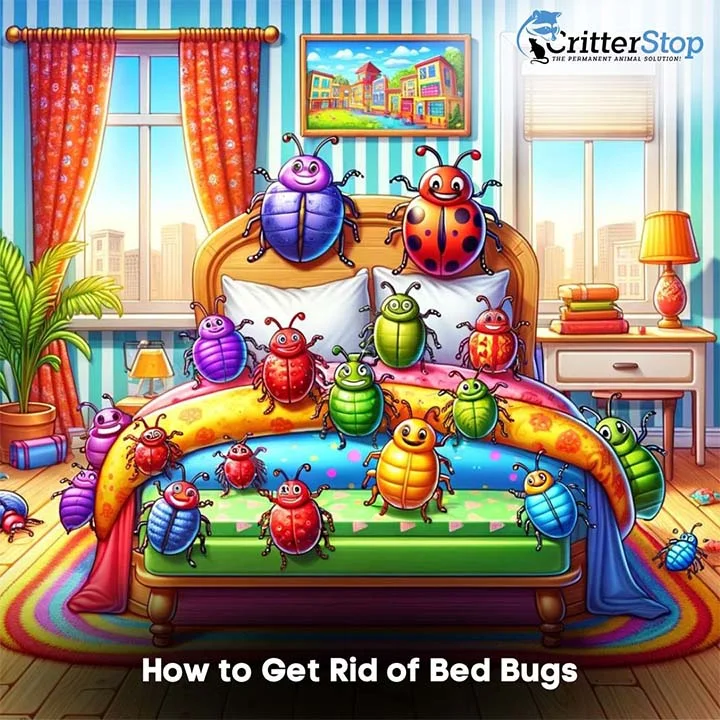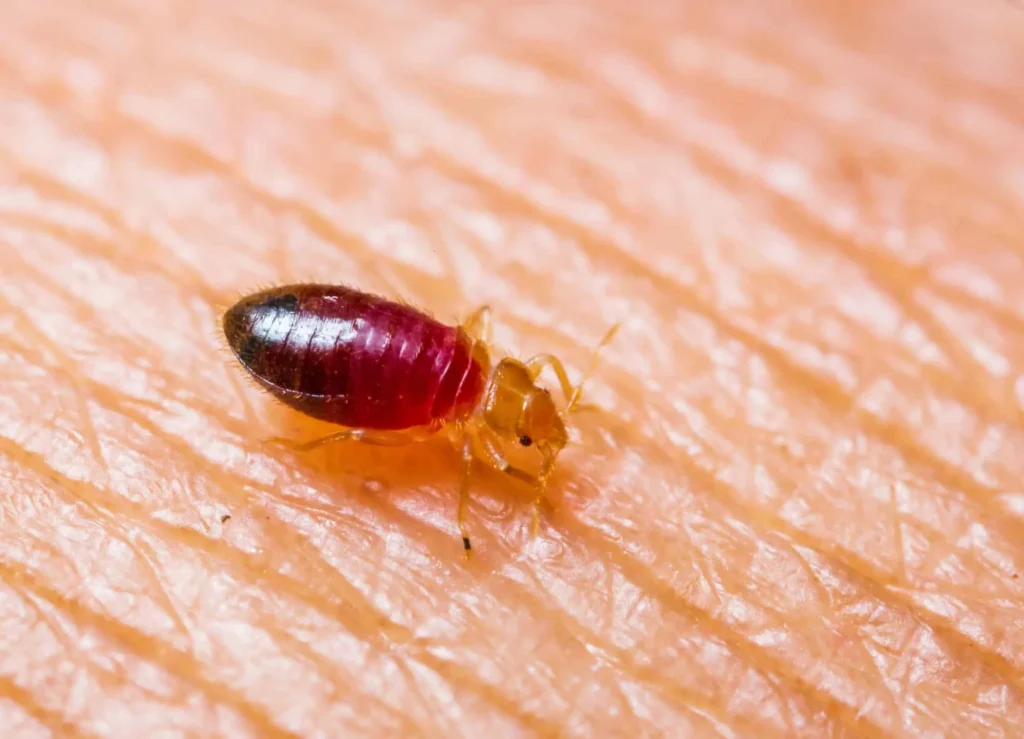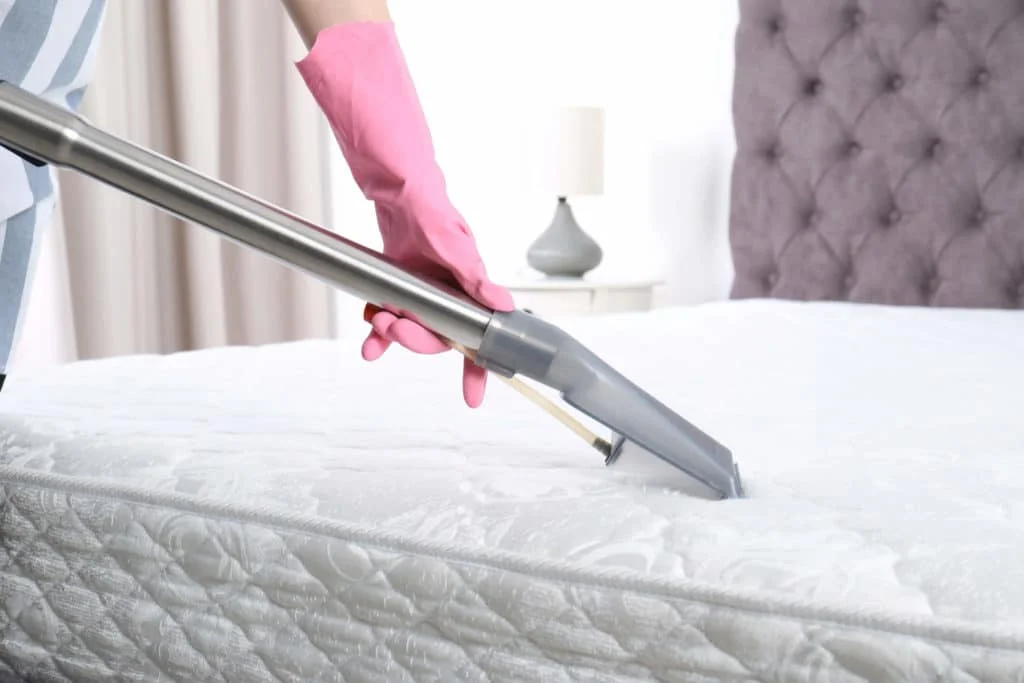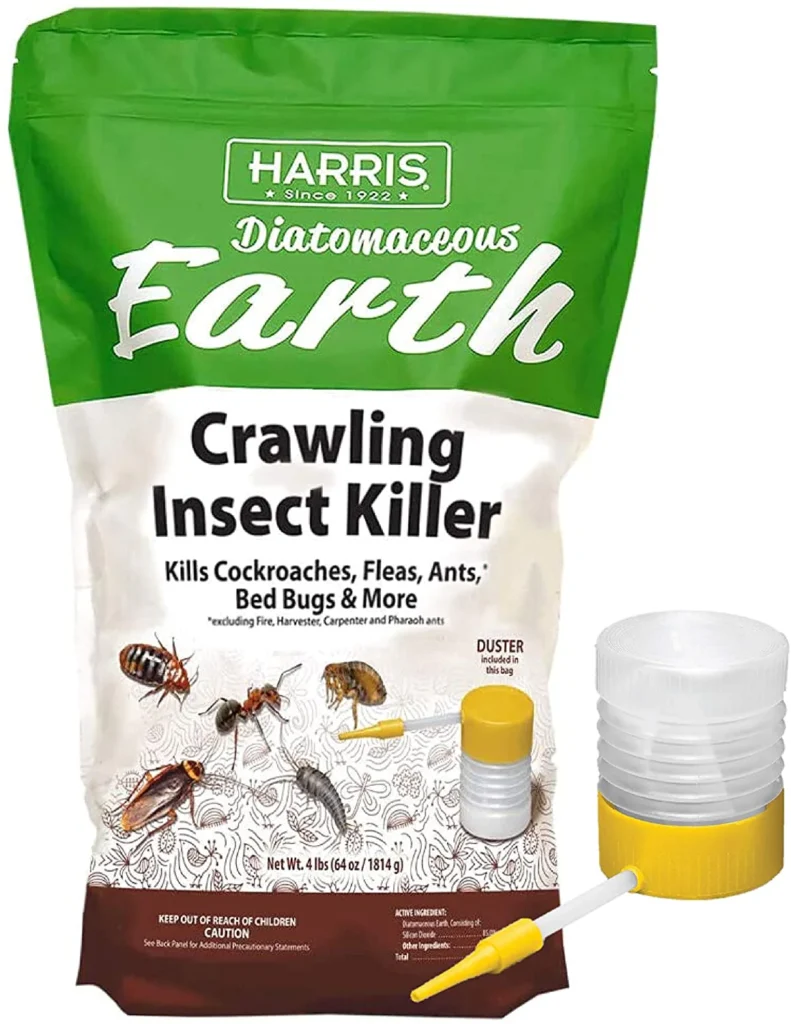
Ever wondered how Bed bugs look? Well they’re very small, reddish-brown insects, they feed on human blood, like very small vampires. You can usually find them in areas or places where people tend to sleep, like beds (hence the name bed bugs), couches, chairs and such. Bed bugs are not known to transmit diseases, but their bites can cause itching and discomfort. If left untreated, a bed bug infestation can quickly become a major problem.
Getting rid of bed bugs can be a challenging and time-consuming process. So the main way is to act quickly at the first sign of an infestation. The first step is to thoroughly inspect all areas especially where the insect can hide, such as mattresses, box springs, furniture and baseboards. If bed bugs are found, it is important to begin treatment immediately to prevent the infestation from spreading.

There are several methods if you are asking how to get a rid of bed bug infestation, including chemical treatments, heat treatments, and vacuuming. One of the treatments are chemical treatments involving the use of insecticides or chemicals to kill bed bugs and their eggs. Heat treatments involve the use of high temperatures to kill bed bugs and their eggs. Vacuuming can help to remove bed bugs and their eggs from furniture and other surfaces. It is important to follow the instructions for any treatment method carefully to ensure that it is effective and safe.
Bed bugs are small, flat, reddish-brown insects that are about the size of an apple seed. They have six legs and two antennae. Bed bugs are often mistaken for other pests such as fleas or ticks, but they have distinct physical characteristics that set them apart. Bed Bugs don't have wings, however they crawl very fast through various surfaces.
Bed bugs tend to hide in small crevices and cracks, making it very difficult to detect. But they’re not that sneaky, and showcase signs that can show an infestation. One of the most common signs of a bed bug infestation is waking up with itchy bites on the skin. Bed bugs typically feed on human blood, so it’s most common places you can find them are where people tend to sleep, like mattresses, bed frames, box springs and such.
Other signs of a bed bug infestation include finding shed skins or eggshells, which are small and white. Bed bugs also leave behind dark spots on bedding or furniture, which are their excrement. If you’re suspicious of a bed bug infestation, you must act quickly to prevent the problem from getting worse.
In conclusion, identifying bed bugs is the first step in getting rid of them. Understanding and having a knowledge of what to expect and look for will help you take action to prevent an infestation from spreading. If you’re suspicious that you have bed bugs at your house, it’s time to take action, like contacting Critter Stop for assistance.
Preventing bed bugs from infesting your home is much easier than getting rid of them. In the following segment, we help you with some steps to prevent bed bugs from infesting your home.
Bed bugs enjoy a lot hiding in cluttered areas, so keep your home as clean and clutter free as possible. This means getting rid of any unnecessary items, such as old newspapers, magazines, and cardboard boxes.

Regular vacuuming can help you prevent bed bugs from invading your home. Remember to always vacuum all the areas in your house, including the carpets, rugs and furniture. Always look closely at cracks and crevices in your home, these are normal places where they can hide.
Bed bugs are often brought into homes from other locations, such as hotels or motels. When traveling, it's important to check for bed bugs in your hotel room before unpacking. Check the mattress, head board, box springs and sheets for any signs of bed bugs like blood stains or fecal matter.
By following these simple steps, you can help prevent bed bugs from infesting your home. Remember to keep your home clean and clutter-free, vacuum regularly, and check for bed bugs when traveling.
When it comes to getting rid of bed bugs, choosing the right treatment method is crucial. There are various options available, and each has its pros and cons. In this section, we'll discuss the three main categories of treatment methods: chemical treatments, non-chemical treatments, and professional extermination options.
Chemical treatments involve the use of insecticides to kill bed bugs. Luckily in the market you can find a plethora of insecticides available, such as dust or powders, sprays, and liquids. Some commonly used chemicals for bed bug control include pyrethroids, neonicotinoids, and organophosphates.
Chemical treatments can be effective in killing bed bugs, but they can also be harmful to humans and pets if not used properly. It's important to carefully read and follow the instructions on the label of any insecticide product you use. Remember that bed bugs can develop resistance to chemicals over time, so it's important to rotate the insecticides you use.

Non-chemical treatments involve the use of methods that don't involve insecticides. One popular non-chemical treatment method is heat treatment. This involves heating up a room or an entire building to a temperature that is lethal to bed bugs. Another non-chemical treatment method is the use of diatomaceous earth, a natural substance that can kill bed bugs by dehydrating them.
Non-chemical treatments can be a good option for those who are concerned about using insecticides. However, since bed bugs are very invasive, these methods sometimes are not as effective as a chemical treatment, and they can be more time-consuming and labor-intensive.
If you have a severe bed bug infestation, or if you've tried other treatment methods without success, it may be time to call in a professional exterminator. Professional exterminators have access to more powerful insecticides and specialized equipment, such as heat chambers and bed bug-sniffing dogs.
Professional extermination options can be expensive, but they are often the most effective way to get rid of bed bugs. Check out reviews, ask people close to you if they can recommend an exterminator, especially with bed bug control, and ask about their methods and the chemicals they use.
Overall, choosing the right treatment method for your bed bug infestation will depend on the infestation and a variety of elements, like how severe your infestation is, how much budget you have, and your preferences. It's important to carefully consider your options and always have feedback or review from an expert like Critter Stop to understand the severity of the issue if you're unsure about the best course of action.
Bed bug infestations can be treated using DIY methods or professional pest control services. Whichever option you choose to treat the infestation depends on the severity of the infestation and personal preferences.
DIY methods can be effective for mild to moderate infestations. These methods involve using non-chemical or chemical treatments to kill bed bugs. Non-chemical treatments include:
Chemical treatments can also be used to kill bed bugs. However, it is important to use only EPA-approved insecticides and follow the instructions carefully. Some common insecticides used for bed bug treatment include pyrethroids, neonicotinoids, and insect growth regulators.
Professional pest control services can be more effective for severe infestations. Companies that dedicate themselves for pest control use various methods to kill bed bugs, which include:
In conclusion, Bed Bigs can be a challenge to treat, but it's all possible with the right methods and tools.DIY methods can be effective for mild to moderate infestations, while professional pest control services are recommended for severe infestations. It is important to follow the instructions carefully and use only EPA-approved insecticides to ensure the safety of people and pets.
If you're looking for a natural way to get rid of bed bugs, there are a few options that may be effective. Here are two remedies that have been known to work:
Diatomaceous earth is a fine powder made from the fossilized remains of tiny aquatic organisms called diatoms. It works by dehydrating the bed bugs, causing them to die. The way to use diatomaceous earth, is to spread a very thin layer of powder on any surface or place where bed bugs might be present. Be sure to wear a mask to avoid inhaling the powder. Leave the powder in place for a couple or several days, then vacuum it up. Repeat the process until the bed bugs are gone.
Boric acid is a white powder that can be used to kill bed bugs. It works by damaging the bed bug's exoskeleton, causing it to dehydrate and die. To use boric acid, lay down a thin layer of the powder on a surface where you saw bed bugs such as the mattress, box spring, and baseboards. Be sure to wear gloves and a mask to avoid skin contact and inhaling the powder. Let the powder sit for a couple of days, then vacuum it up. Repeat the process until the bed bugs are gone.
Remember that natural methods may not be as effective as chemical treatments, and take longer time, but you can use them as a preventive manner. It's also important to check all areas where bed bugs may be present, and to take steps to prevent future infestations. If the situation is getting severe, it may be best to consult a professional pest control company to ensure complete eradication of the bed bugs.
In summary, getting rid of bed bugs requires a combination of professional help and personal efforts. Your first step is to identify the infestation and call a professional to assess the situation. It will all depend on how severe your infestation is, the treatment you choose, the professional may recommend a combination of treatments, including chemical and non-chemical methods.
Note that not all the treatments are effective for bed bugs, so it is crucial to follow the professional's recommendations and instructions carefully. Additionally, personal efforts such as washing and drying bedding and clothing at high temperatures, vacuuming regularly, and sealing cracks and crevices can also help eliminate bed bugs.
To prevent future infestations, it is important to take proactive measures. This includes inspecting secondhand furniture before bringing it into the home, sealing cracks and crevices, and using mattress and box spring encasements. If you travel, always inspect and check the hotel for any signs of bed bugs before unpacking and avoid placing luggage on the bed or floor.
Note that when you notice a sign of bed bugs, such as small red or brown spots on bedding or furniture, and act quickly if an infestation is suspected. Being careful and vigilant, individuals can reduce their risk of a bed bug infestation.
Overall, getting rid of bed bugs can be time consuming and a challenge, but with the help of professional and personal efforts, it is possible to eliminate these pests and prevent future infestations.
The most effective bed bug treatment is a combination of chemical and non-chemical methods. Professional pest control services may use insecticides, heat treatment, and vacuuming to eliminate bed bugs. It is important to hire a licensed and experienced professional to ensure the safety and effectiveness of the treatment.
Yes, heat treatment can completely eliminate bed bugs. At a temperature of 120 degrees Fahrenheit bed bugs can’t survive naturally so professional heat treatment can be an effective method of eradication. Note that all the areas that are infested reach the necessary temperature for the treatment to be effective.
To get rid of bugs in your bed, start by washing all bedding, linens, and curtains in hot water and dry them on the highest dryer setting. Vacuum your bed, bed frame, and surrounding area thoroughly. Seal cracks in the bed frame and surrounding walls to eliminate hiding spots. Consider using a mattress encasement to protect against bed bugs. If the infestation persists, professional pest control services may be necessary to effectively eliminate the bugs.
Diatomaceous earth can be effective in controlling bed bug infestations, but it should not be relied on as the sole method of treatment. Diatomaceous earth is a natural method that can be applied to areas where bed bugs are present, but it will not be the main solution in eliminating all bed bugs. It is important to use a combination of methods for the best results.
To quickly get rid of bed bugs, thoroughly vacuum all areas of your bedroom, including the mattress, bed frame, and furniture. Wash all bedding and clothes in hot water and dry on high heat. Use a steamer on the mattress, box spring, and other infested furniture. Apply a bed bug-specific insecticide according to the manufacturer's instructions, focusing on cracks and crevices where bed bugs hide. Consider encasing your mattress and box spring in bed bug-proof covers. If the infestation is severe, hiring a professional exterminator may be the most effective and fastest solution.
To get rid of bed bugs in mattresses, start by vacuuming the mattress thoroughly, paying special attention to seams and crevices. After vacuuming, use a steamer over the entire surface of the mattress to kill any remaining bed bugs and eggs with high heat. Then, encase your mattress in a bed bug-proof cover to trap any remaining bugs and prevent new ones from entering. Regularly inspect the mattress and surrounding areas for signs of bed bugs, and maintain cleanliness to prevent future infestations. If the infestation persists, consider professional pest control services.
To eliminate bed bugs from furniture, vacuum thoroughly, steam all surfaces for heat treatment, apply bed bug-specific insecticide or diatomaceous earth, and seal heavily infested items in plastic to suffocate remaining bugs. Regularly inspect and clean to avoid re-infestation. For severe cases, seek professional pest control.
The best strategies for dealing with bed bug bites is quickly washing the affected area with soap and water, applying a cold compress to reduce swelling, and using over-the-counter anti-itch creams or antihistamines. Don’t scratch the bites, this will cause an infection.
Various home remedies can be used to effectively deal with bed bugs, such as steam cleaning, vacuuming, and washing the bedding and clothing of your bed in very hot water. However, it is important to note that home remedies may not be effective in eliminating all bed bugs and it may be necessary to seek professional pest control services.
The length of time it takes to completely eradicate a bed bug infestation depends on the severity of the infestation and the methods used for treatment. A couple of weeks or months will completely eliminate all bed bugs. It is important to follow the recommendations of a licensed pest control professional and to continue monitoring for bed bugs even after treatment is complete.
Afraid of Bed Bugs and want to prevent them? At Critter Stop with our unique mechanism, we can help you check and get rid of them, you can Contact Us or call us at: (214) 234-2616 and our team will gladly assist you to check for bed bugs if you’re not sure.
Visit our Critter Library and learn more about our furry friends